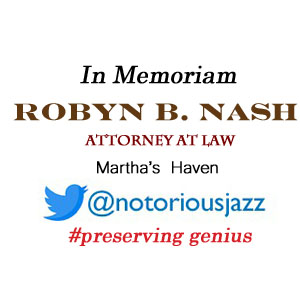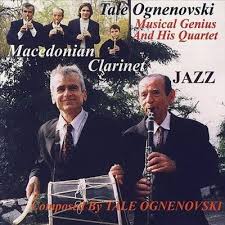
Daily Dose Of Jazz…
Tale Ognenovski was born April 27, 1922 in Brusnik, Bitola, Kingdom of Yugoslavia. He inherited his talent from his reed pipe great-grandfather Ognen and grandfather Risto and his father Jovan who played bagpipes. When he was seven he began playing on the reed pipe. With his father passing away in 1937 and when he was fifteen his grandmother gave him some money to buy his first clarinet.
During WWII he served as a Macedonian Partisan, Tale began playing clarinet at celebrations and concerts in villages and the town of Bitola with numerous musicians. For three years beginning in 1951 he worked as a member of the Police Wind Orchestra and from 1954 till 1956 he worked with the Public Town Skopje Orchestra.
1956 saw him performing to a capacity audienceat Carnegie Hall in New York City as a clarinet and reed pipe/recorder soloist of the Macedonian State Ensemble of Folk Dances and Songs. A seven year residency starting in 1960 had Ognenovski working with Radio Television Skopje. He went on to play in orchestras and ensembles that toured North America, and Europe.
HIs recordings were not singularly jazz, but included the works of Benny Goodman and Artie Shaw. Tale also recorded classical and folk dances, often interlinking the three genres. Alongside his son Stevan, they arranged for two clarinets the music of Mozart. He was the recipient of twenty-one prestigious awards, had several articles and was recognized as one of the top 100 clarinetists of all time.
Clarinetist Tale Ognenovski, who authored a book on Macedonia dance and was biographed by his son Stevan, died in Skopje, Macedonia on June 19, 2012.
More Posts: arranger,bandleader,clarinet,history,instrumental,jazz,music,recorder
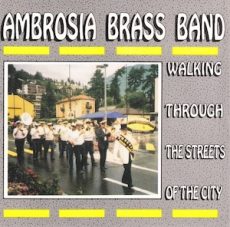
Daily Dose Of Jazz…
Nino Frasio was born April 26, 1950 in Milan, Italy and his introduction in music was taken in 1964 as a guitarist and banjoist. He graduated in 1976 from the Universitá degli Studi of Milano and studied with professor Enea Vallesi. Like most eenage players of the time he followed the Beatles craze, playing lead guitar where he also disastrously attempted to sing somewhat understandable English.
In 1969 he joined the Italian cast of Up With People! and played many performances on lead guitar and tenor banjo. Leaving the show in 1971, when he started his day job career, and since then has dedicated himself exclusively to classic jazz. His banjo studies had him discovering the other four string tuning and soon was doubling on tenor and plectrum banjo.
After performing on the national Italian TV network on a broadcast of Musica Insieme, he founded the New Orleans styled Olympia Ragtime Band in 1972. a pure New Orleans style band in which he played banjo. Frasio left the band in the early ’80s and started a busy musical career as a free-lance performer with the many jazz bands active in Northern Italy. By 1973 he was enlisted in the Italian Air Force where he began the study of cornet and tuba. Post discharged he chose to play the tuba.
In 1984 Nino joined the Ambrosia Brass Band as a sousaphonist which gained a wide popularity all over Europe playing marches in the style of the great brass bands of New Orleans. He continued freelancing gigs on banjo and guitar, and participated in a long-lasting series of weekly live radio broadcasts.
In the mid-Nineties Frasio went back to playing classic jazz with a new project called the Odd Fellows New Orleans Quartet & Band. Three years later he joined the Jumpin’ Jazz Ballroom Orchestra on banjo and guitar and the ten piece band played a repertory of classic jazz tunes of the ’20s, ’30s and ’40s.
As he aged Nino slowed down his freelance playing and started to look for his old music pals again to play his banjo in a strict New Orleans style. He went on to become a founding member of the Pegasus Brass Band, which performed at several European jazz festivals. He played regularly with the Milano Rhythm Kings led by Giorgio Alberti, then with the Savannah Serenaders, before joining on guitar the Prefisso02 Orchestra, with its beautiful repertoire of early ’40s Italian swing.
Banjoist Nino Frasio, who also plays guitar, tuba and sousaphone, continues to perform with a series of brass bands and orchestras.
More Posts: banjo,guitar,history,instrumental,jazz,music,sousaphone,tuba
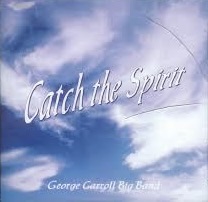
Daily Dose Of Jazz…
Eldon Payne was born in Morristown, Tennessee on April 25, 1957. He graduated cum laude from the University of Tennessee in Knoxville with a B.S. in Business Administration in 1979. Then he moved to Tampa, Florida in the spring of 1980.
Retiring from Delta Air Lines with twenty five years of service in 2008, Eldon performed during that period with the University of Tennessee Campus Band, Tampa Bay Buccaneer Band, Shades of Blue, Boulevard Jazz Orchestra, The Mostly Pops Orchestra, Helios Jazz Orchestra, Cigar City Big Band, Swing Sound Orchestra, Frankie D. New York Orchestra, Clearwater Community Jazz Band, Sun City Center Big Band, George Carroll Big Band, Gulf Bay Big Band, Ten O’clock Big Band, Frank Parsons Band, Ed Geimer Big Band, Encore IV Big Band, and The Sarasota Jazz Project.
Over the course of his career Payne has performed at several Florida clubs and festivals as well as backing the likes of Margo Rey, Denise Moore, Kathy Kosins, Michael Lynche, Bryan Hughes, Lorri Hafer, Chuck Wansley, Whitney James, Alexis Cole and the late Kevin Mahagony.
Trombonist Eldon Payne, who never recorded as a leader, continues to perform and record as a sideman and studio musician.
More Posts: history,instrumental,jazz,music,trombone
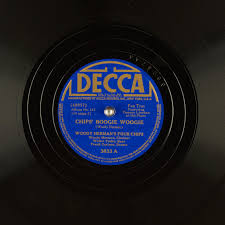
Daily Dose Of Jazz…
Walt Yoder was born on April 21, 1914 in Hutchinson, Kansas. A piano player from age ten, he switched to bass as a teenager. Early in the 1930s he worked in the bands of Joe Haymes, Tommy Dorsey, and Jimmy Dorsey.
Yoder played with Woody Herman in the Isham Jones band in the middle of the 1930s. After this ensemble dissolved in 1936, Herman formed a new group with five of Jones’s former sidemen, including Walt. He remained with Herman through 1942 and played with him again in 1947-48.
Following his tenure with Herman, Yoder played with Ben Pollack, Russ Morgan, Bob Crosby, and Red Nichols. He did some works as a bandleader and in the studios near Los Angeles later in his life, playing into the 1970s.
Double bassist Walt Yoder, best known for his association with Woody Herman, died on December 2, 1978 in Los Angeles, California.
More Posts: bass,history,instrumental,jazz,music
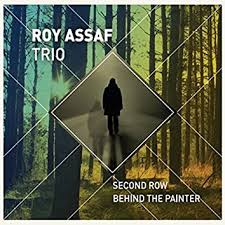
Daily Dose Of Jazz…
Roy Assaf was born on April 10, 1982 in Beersheba, Israel and studied at Tel Aviv Conservatory. Coming to America he continued his studies at Berklee College of Music in Boston, Massachusetts and then migrated to New York City and while earning his Master of Art at the Manhattan School of Music, he established his reputation as one of the most sought-after young pianists in the New York jazz scene.
After a meeting with legendary bassist and producer John Lee soon found Roy touring around the world and playing the most prestigious festivals, clubs, and concert halls with the Dizzy Gillespie All Stars, a band that included James Moody, Jimmy Heath, Paquito D’Rivera, Roy Hargrove, Lewis Nash, Randy Brecker, Antonio Hart, and other jazz masters.
Before long, Assaf was getting calls from some of the world’s most influential contemporary jazz bands that included the Slide Hampton Sextet, The Mingus Big Band, Steve Turre’s bands, Roberta Gambarini Quartet, David Sanborn Group, Claudio Roditi Quartet, and many others.
In 2012, he released his debut album, Respect, on Jazz Legacy Productions accompanied by bassist Reuben Rogers and drummer Greg Hutchinson. The following year he formed a trio with Raviv Markovitz on bass and Jake Goldbas on drums and together they began to establish the unique voice of the Roy Assaf Trio.
Pianist and composer Roy Asssaf, who has released two albums and has won several awards including one from ASCAP, a Eubie Blake and two from DownBeat and others, continues to perform across the globe.
More Posts: bandleader,composer,history,instrumental,jazz,music,piano


